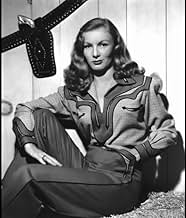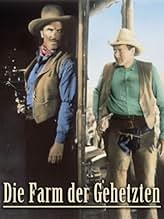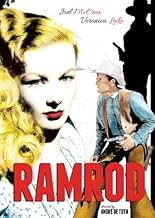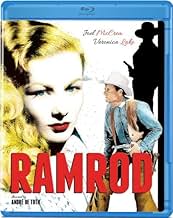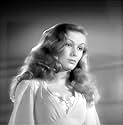Story about violent feud between Connie Dickason, the owner of the Circle 66 ranch and rancher Frank Ivey, the self-proclaimed boss of an otherwise public grazing land.Story about violent feud between Connie Dickason, the owner of the Circle 66 ranch and rancher Frank Ivey, the self-proclaimed boss of an otherwise public grazing land.Story about violent feud between Connie Dickason, the owner of the Circle 66 ranch and rancher Frank Ivey, the self-proclaimed boss of an otherwise public grazing land.
Charles Ruggles
- Ben Dickason
- (as Charlie Ruggles)
Houseley Stevenson
- George Smedley
- (as Housely Stevenson)
Ward Wood
- Link Thoms
- (as Robert Wood)
Victor Potel
- Burch Nellice
- (as Vic Potel)
Featured reviews
This was a surprisingly brutal western, more like a film noir from the late 1940s, with rough characters who shot first and thought later.
Among those with the rough attitudes was the female lead, Veronica Lake, who was nearing the end of her short career. Without the makeup and long blonde hair, she didn't look that pretty. The good guys were played by Joel McCrea and Donald Crisp.
Almost everyone in this film gets shot or killed. Many critics labeled this a B-movie but it sure had a lot of well-known actors for that label. Preston Foster, Don DeFore and Lloyd Bridges also star. The only actor who sounded B movie-ish was Arleen Whalen. Despite her good looks, I can see why she never made it to stardom.
I like black-and-white but this was film that would have looked better in some nice Technicolor with the great mountain scenery that was featured.
Among those with the rough attitudes was the female lead, Veronica Lake, who was nearing the end of her short career. Without the makeup and long blonde hair, she didn't look that pretty. The good guys were played by Joel McCrea and Donald Crisp.
Almost everyone in this film gets shot or killed. Many critics labeled this a B-movie but it sure had a lot of well-known actors for that label. Preston Foster, Don DeFore and Lloyd Bridges also star. The only actor who sounded B movie-ish was Arleen Whalen. Despite her good looks, I can see why she never made it to stardom.
I like black-and-white but this was film that would have looked better in some nice Technicolor with the great mountain scenery that was featured.
Nice guy Joel McCrea is torn between pint-sized femme fatale Veronica Lake and decent seamstress Arleen Whelan in this serviceable Western from the under-valued Andre De Toth. McCrea looks a little lightweight compared to Don Defore and Preston Foster, who stand out as a free-wheeling gun for hire with ambiguous intent and a rancher's heavy with a town under his thumb in a film that's brimming with bad guys. The plot twists and turns, but never quite takes off.
10mi6nick
Contrary to previous reviews of Ramrod, de Toth's film is much more interesting than a "simple cattle vs. sheep" plot-driven western. Just look at Lake's Connie Dickinson. This is a typical femme fatale archetype taken straight from film noir (realistically, the character derives from hard-boiled pulp literature which Luke Short fused with his western story).
Sexually alluring Connie uses her potent sway over men to achieve her greedy ambitions of wealth and power, and is unafraid to send men to their deaths for her cause. Connie's strength of character is atypical of the western genre at this stage, and her strength seems to come from the relative weakness of the film's hero, played by Joel McCrea; who seems to lack the strong sense of moral certainty that the typical westerner was founded upon.
Along with Raoul Walsh's Pursued (1947), and Robert Wise's Blood on the Moon (1948), Ramrod stands as one of the few hybrids between film noir and the western. Regardless of your standpoint on the status of film noir, all of these films contain typical elements from the pessimistic noirs of the 40's and 50's, particularly formal and stylistic devices, as well as recurring personnel, especially directors, stars (ie. Robert Mitchum), and cinematographers. Crucially though, the western genre before this stage was a particularly optimistic one; look at Stagecoach (John Ford, 1939), Dodge City (Michael Curtiz, 1939), or even My Darling Clementine (Ford again, 1946); the three films I mentioned beforehand, including Ramrod, all offer instances of pessimistic worldviews, and morally ambiguous characters and situations, even though they all end with the hero getting the girl and riding into a westward sunset.
Sexually alluring Connie uses her potent sway over men to achieve her greedy ambitions of wealth and power, and is unafraid to send men to their deaths for her cause. Connie's strength of character is atypical of the western genre at this stage, and her strength seems to come from the relative weakness of the film's hero, played by Joel McCrea; who seems to lack the strong sense of moral certainty that the typical westerner was founded upon.
Along with Raoul Walsh's Pursued (1947), and Robert Wise's Blood on the Moon (1948), Ramrod stands as one of the few hybrids between film noir and the western. Regardless of your standpoint on the status of film noir, all of these films contain typical elements from the pessimistic noirs of the 40's and 50's, particularly formal and stylistic devices, as well as recurring personnel, especially directors, stars (ie. Robert Mitchum), and cinematographers. Crucially though, the western genre before this stage was a particularly optimistic one; look at Stagecoach (John Ford, 1939), Dodge City (Michael Curtiz, 1939), or even My Darling Clementine (Ford again, 1946); the three films I mentioned beforehand, including Ramrod, all offer instances of pessimistic worldviews, and morally ambiguous characters and situations, even though they all end with the hero getting the girl and riding into a westward sunset.
Veronica Lake in her memoirs said that Joel McCrea was one of the kindest, most decent men she ever knew or worked with. When she was writing that she was talking about Sullivan's Travels which is certainly one of the high points in both of their careers.
Ramrod is light years from Preston Sturges. Based on a Luke Short novel it's a pretty grim and violent film. Preston Foster is the owner of the big spread in the neighborhood and a close ally of his is Charlie Ruggles who has an adjoining piece of territory. Foster's taken a shine to Ruggles daughter Veronica Lake, but she can't stand the sight of him. When Foster bullies her fiancé out of town, Lake wants vengeance.
She's got her own piece of land now and hires Joel McCrea to run it for her. The range war starts, but Lake thinks McCrea is too soft in his approach. She starts some backchannel schemes of her own.
The result of this is a whole lot of dead bodies piling up. A windfall for the coroner.
As always Joel McCrea is the moral centerpiece of the film, he's once again the gallant western hero. Preston Foster is the town bully you love to hate. Foster did a variation on this part again in Law and Order a few years later.
Cast against type are Don DeFore and Charlie Ruggles. DeFore who was usually the hero's best friend and a jovial kind of guy, is a violence prone sort of fellow, who Lake manipulates among others. And it is hard to believe that Charlie Ruggles ever played anyone as serious on film before or since. Our image of him is usually the henpecked husband opposite Mary Boland from the Thirties.
This film is significant for Lake because she married Director Andre DeToth. DeToth claims to have been married seven times, but only three are listed on his page at IMDb. It was not a happy union, but DeToth did get a good performance out of his bride.
Ramrod may be one of the earliest examples of an adult western. It is grim and violent, but fascinating.
Ramrod is light years from Preston Sturges. Based on a Luke Short novel it's a pretty grim and violent film. Preston Foster is the owner of the big spread in the neighborhood and a close ally of his is Charlie Ruggles who has an adjoining piece of territory. Foster's taken a shine to Ruggles daughter Veronica Lake, but she can't stand the sight of him. When Foster bullies her fiancé out of town, Lake wants vengeance.
She's got her own piece of land now and hires Joel McCrea to run it for her. The range war starts, but Lake thinks McCrea is too soft in his approach. She starts some backchannel schemes of her own.
The result of this is a whole lot of dead bodies piling up. A windfall for the coroner.
As always Joel McCrea is the moral centerpiece of the film, he's once again the gallant western hero. Preston Foster is the town bully you love to hate. Foster did a variation on this part again in Law and Order a few years later.
Cast against type are Don DeFore and Charlie Ruggles. DeFore who was usually the hero's best friend and a jovial kind of guy, is a violence prone sort of fellow, who Lake manipulates among others. And it is hard to believe that Charlie Ruggles ever played anyone as serious on film before or since. Our image of him is usually the henpecked husband opposite Mary Boland from the Thirties.
This film is significant for Lake because she married Director Andre DeToth. DeToth claims to have been married seven times, but only three are listed on his page at IMDb. It was not a happy union, but DeToth did get a good performance out of his bride.
Ramrod may be one of the earliest examples of an adult western. It is grim and violent, but fascinating.
Some reviewers complain of a slow pace, but that wasn't my impression. The story is told in a straightforward, understated manner, trusting the audience to connect the dots and not wasting thirty seconds on a scene if it can be done in ten. It moves at a good pace most of the time, even though, at the end, the payoff is a bit easy and conventional. Because of that, it turns out not to be as good as it promised during the first part, when there was plenty of tension and psychological work.
The unusual setup is a strong point, subverting the trope of the beautiful lady rancher harassed by the evil local despots who want to run her out of her ranch. In this case, the lady rancher is as evil and petty as them. She boasts "From now on, I'm going to make a life of my own. And, being a woman, I won't have to use guns." She may not use them personally, but plenty of men are going to die because of her war, which is more a vanity project than really necessary for her to live her life.
I'm not a big fan of McCrea or Lake, but they are helped by a capable supporting cast.
I also need to mention the stunning scenery, shot in black and white. The camera doesn't linger in it often, though. More than the traditional open spaces of a western, here the story is sometimes claustrophobic and dark. It's kind of a hardboiled noir film.
I find it underrated, although it could have stuck the landing better.
The unusual setup is a strong point, subverting the trope of the beautiful lady rancher harassed by the evil local despots who want to run her out of her ranch. In this case, the lady rancher is as evil and petty as them. She boasts "From now on, I'm going to make a life of my own. And, being a woman, I won't have to use guns." She may not use them personally, but plenty of men are going to die because of her war, which is more a vanity project than really necessary for her to live her life.
I'm not a big fan of McCrea or Lake, but they are helped by a capable supporting cast.
I also need to mention the stunning scenery, shot in black and white. The camera doesn't linger in it often, though. More than the traditional open spaces of a western, here the story is sometimes claustrophobic and dark. It's kind of a hardboiled noir film.
I find it underrated, although it could have stuck the landing better.
Did you know
- TriviaAt the time of filming, Veronica Lake and director André De Toth were married. This film was their first screen collaboration.
- GoofsActor Houseley Stevenson's name is misspelled onscreen as "Housely."
- Quotes
Connie Dickason: From now on, I'm going to make a life of my own. And, being a woman, I won't have to use guns.
- ConnectionsReferenced in You Must Remember This: Veronica Lake (Dead Blondes Part 4) (2017)
- How long is Ramrod?Powered by Alexa
- What is the name of the long-haired mustachioed cowboy who went up into the hills with Preston Foster (as Frank Ivey) after Don Defore (as Bill Schell)?)
Details
Box office
- Budget
- $2,000,000 (estimated)
- Runtime1 hour 34 minutes
- Color
- Aspect ratio
- 1.33 : 1
Contribute to this page
Suggest an edit or add missing content




